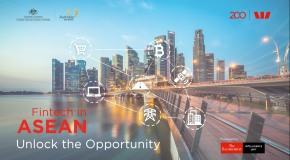Fintech in ASEAN: Unlock the Opportunity
A booming global industry, fintech brings new innovations to traditional financial services and in the process can help reach new population segments and enable the provision of new products and services to existing customers. The basic premise is that fintech promises to improve the efficiency and effectiveness of business operations and financial transactions among large established institutions and start-ups alike, a process often relying on an increase in online access and smartphone penetration.
Related content

The shifting landscape of global wealth: Future-proofing prosperity in a ti...
In some instances the impact of this shift will be shaped by local factors, such as demographic changes. In other instances this shift will reflect shared characteristics, as demonstrated by the greater popularity of overseas investing among younger high-net-worth individuals (HNWIs) brought up in an era of globalisation. Whatever the drivers, the landscape of wealth is changing—from local to global, and from one focused on returns to one founded on personal values.
Despite rising economic concerns and a tradition of investor home bias in large parts of the world, the new landscape of wealth appears less interested in borders. According to a survey commissioned by RBC Wealth Management and conducted by The Economist Intelligence Unit (EIU), younger HNWIs are substantially more enthusiastic about foreign investing. The U.S. is a particularly high-profile example of a country where a long-standing preference for investments in local markets appears set to be transformed.
Click the thumbnail below to download the global executive summary.
Read additional articles from The EIU with detail on the shifting landscape of global wealth in Asia, Canada, the U.S. and UK on RBC's website.

Fintech in ASEAN
To better understand the opportunities and challenges in developing a fintech business in seven ASEAN markets, The Economist Intelligence Unit conducted wide-ranging desk research supplemented by seven in-depth interviews with executives in Australia and ASEAN.
Download report and watch video interview to learn more.

Risks and opportunities in a changing world
Read our Taxing digital services, U.S. tax reform: The global dimension, & Planning for life after NAFTA articles by clicking the thumbnails below.
Fintech in ASEAN: Unlock the Opportunity
Related content

The shifting landscape of global wealth: Future-proofing prosperity in a ti...
In some instances the impact of this shift will be shaped by local factors, such as demographic changes. In other instances this shift will reflect shared characteristics, as demonstrated by the greater popularity of overseas investing among younger high-net-worth individuals (HNWIs) brought up in an era of globalisation. Whatever the drivers, the landscape of wealth is changing—from local to global, and from one focused on returns to one founded on personal values.
Despite rising economic concerns and a tradition of investor home bias in large parts of the world, the new landscape of wealth appears less interested in borders. According to a survey commissioned by RBC Wealth Management and conducted by The Economist Intelligence Unit (EIU), younger HNWIs are substantially more enthusiastic about foreign investing. The U.S. is a particularly high-profile example of a country where a long-standing preference for investments in local markets appears set to be transformed.
Click the thumbnail below to download the global executive summary.
Read additional articles from The EIU with detail on the shifting landscape of global wealth in Asia, Canada, the U.S. and UK on RBC's website.

Fintech in ASEAN
To better understand the opportunities and challenges in developing a fintech business in seven ASEAN markets, The Economist Intelligence Unit conducted wide-ranging desk research supplemented by seven in-depth interviews with executives in Australia and ASEAN.
Download report and watch video interview to learn more.

Risks and opportunities in a changing world
Read our Taxing digital services, U.S. tax reform: The global dimension, & Planning for life after NAFTA articles by clicking the thumbnails below.
Fintech in ASEAN
To better understand the opportunities and challenges in developing a fintech business in seven ASEAN markets, The Economist Intelligence Unit conducted wide-ranging desk research supplemented by seven in-depth interviews with executives in Australia and ASEAN.
Download report and watch video interview to learn more.
More from this series

white paper
Fintech in ASEAN: Unlock the Opportunity
A booming global industry, fintech brings new innovations to traditional financial services and in the process can help

video
Fintech in ASEAN: Unlock the Opportunity
ASEAN has the fastest growing middle class in the world and nascent financial infrastructure. What does that mean
Related content

The shifting landscape of global wealth: Future-proofing prosperity in a ti...
In some instances the impact of this shift will be shaped by local factors, such as demographic changes. In other instances this shift will reflect shared characteristics, as demonstrated by the greater popularity of overseas investing among younger high-net-worth individuals (HNWIs) brought up in an era of globalisation. Whatever the drivers, the landscape of wealth is changing—from local to global, and from one focused on returns to one founded on personal values.
Despite rising economic concerns and a tradition of investor home bias in large parts of the world, the new landscape of wealth appears less interested in borders. According to a survey commissioned by RBC Wealth Management and conducted by The Economist Intelligence Unit (EIU), younger HNWIs are substantially more enthusiastic about foreign investing. The U.S. is a particularly high-profile example of a country where a long-standing preference for investments in local markets appears set to be transformed.
Click the thumbnail below to download the global executive summary.
Read additional articles from The EIU with detail on the shifting landscape of global wealth in Asia, Canada, the U.S. and UK on RBC's website.

Risks and opportunities in a changing world
Read our Taxing digital services, U.S. tax reform: The global dimension, & Planning for life after NAFTA articles by clicking the thumbnails below.

Resetting the agenda: How ESG is shaping our future
The Covid-19 pandemic has exposed a wealth of interconnections – between ecological and human wellbeing, between economic and environmental fragility, between social inequality and health outcomes, and more. The consequences of these connections are now filtering through, reshaping our society and economy.
In this setting, the need to integrate environmental, social and governance (ESG) factors when investing has become even more critical. Institutional investors must employ ESG not just to mitigate risks and identify opportunities, but to engage with companies to bring about the positive change needed to drive a sustainable economic recovery in the post-Covid world.
In order to understand how ESG could be both a new performance marker and a growth driver in this environment, as well as how institutional investors are using ESG to make investment decisions and to assess their own performance, The Economist Intelligence Unit (EIU), sponsored by UBS, surveyed 450 institutional investors working in asset and wealth management firms, corporate pension funds, endowment funds, family offices, government agencies, hedge funds, insurance companies, pension funds, sovereign wealth funds and reinsurers in North America, Europe and Asia-Pacific.
Download the report and infographic to learn more.


